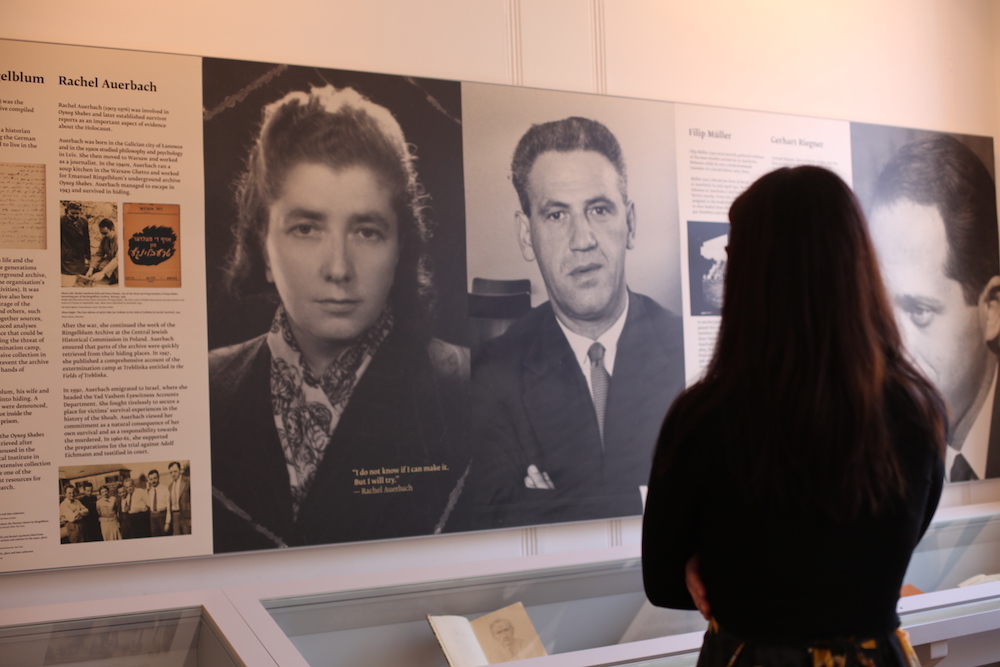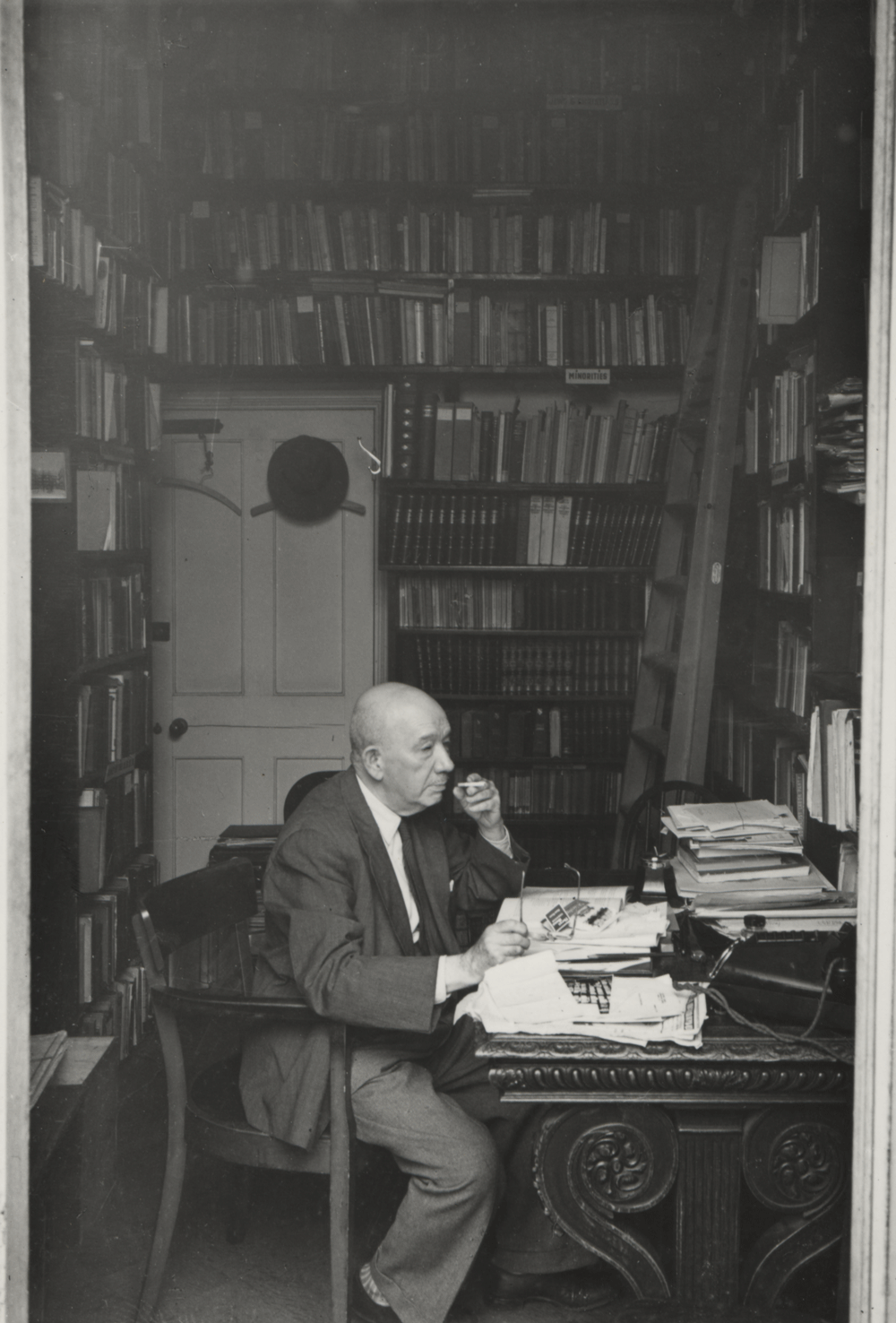This article originally appeared on VICE UK.
In a bright room at the Wiener Library—the world's oldest Holocaust archive, in a building off Russell Square, London—the curator Barbara Warnock is telling me about the first generation of Holocaust researchers; men and women who risked their lives, during and after the war, to collect evidence of all kinds that bore witness to the horrors that they themselves often experienced.
It's the day before the opening of the library's exhibition, Crimes Uncovered: The First Generation of Holocaust Researchers. The walls are lined with pictures of people, places, books, and records. We look up at a middle-aged man in a suit, wide-shouldered, charismatic, a wry look on his face. A picture taken years after the war, years after horrors few of us can imagine.
Filip Müller was barely 20 years old when, in April of 1942, he was deported to the Auschwitz concentration camp. The young Jewish Slovak was a sonderkommando; part of a forced labor unit, he was ordered to burn the bodies of his fellow prisoners in the ovens. As far as the Nazis were concerned, Müller was good at the job, able to tell those who were about to be murdered that they were safe as he readied the gas chambers.
That—along with his extraordinary mental and physical toughness—played a part in ensuring his survival. But during his time in Auschwitz, Müller was doing something else: collecting evidence. Caught in a horrific, vulnerable position, the young man tried to kill himself when he realized that he had been facilitating the killing of thousands of Jews. He entered a gas chamber along with a group of fellow prisoners who were forced there, but, as he recorded in a memoir written years after the war, a little girl came up to him and convinced him not to do what he was doing.
"We understand that you have chosen to die with us of your own free will, and we have come to tell you that we think your decision is pointless," she told him. "Perhaps you'll survive this terrible tragedy and then you must tell everybody what happened to you."
So this is what Müller did. He had an eye on history, on recording what had happened, to make sure the world knew what was happening in the hell he found himself in.

"It may have also been, for someone like Müller, a way of keeping hold of your own humanity whilst you're being forced to be involved in the most inhumane acts," Warnock tells me. "He was having to work in the gas chambers and dispose of the bodies. Being involved in the gathering of information and resistance might have been a way of holding onto your humanity."
Müller tried to keep records of the names of SS officers working around him, as well as notes of the transports that arrived at the camp. He managed to get a label from a can of Zyklon B, the poison that was used to kill at least a million people at Auschwitz and Majdanek. He obtained plans of the gas chambers and crematoria and he passed all this information on to two of his fellow inmates, Rudolf Vrba and Alfred Wetzler.
Also sonderkommando, Vrba, and Wetzler were charged with escaping from Auschwitz, which they managed, on the eve of Passover, April 7, 1944, hiding in a wood pile for three nights, soaked to the bone, counting down the time for almost 80 hours.
By this point, the Allies already knew that Jews were being murdered in vast numbers at Auschwitz. Based in London, the Polish government in exile had contacts in resistance networks passing information to them, and in late 1942 they issued a note to the embryonic United Nations entitled The Mass Extermination of Jews in German Occupied Poland. But the eyewitness accounts written by Vrba and Wetzler after their escape, The Auschwitz Protocols, were a great leap forward in terms of enlightening the public and ruling powers across the world as to what was happening in the extermination camps. Müller himself remained at Auschwitz until, with the Red Army looming, the Germans abandoned it. He was forced to march to Mauthausen concentration camp in Austria, which was eventually liberated.
After the war, says Warnock, "He just settled into a fairly ordinary life except, periodically, appearing to give testimony." He wrote his memoir, was interviewed by Claude Lanzmann for the magisterial, nine-hour long documentary Shoah, lived in Prague, and then in the west until his death in 2013, at the age of 91.
There are many more stories. Of Emmanuel Ringelblum and Rachel Auerbach, who, as part of the Onyeg Shabbos (Joy of Sabbath) group, collected evidence from inside the Warsaw ghetto and then buried that evidence in milk cans in basements and inside the cavities of buildings. They both escaped; while Auerbach survived, Ringelblum was killed. After the war, the testimonies on Jewish life they had collected in the ghetto were partially recovered, Auerbach returning to the places she’d hidden them and recovering some of the evidence. Some of it may still be there in Warsaw.

Then there's Alfred Wiener himself, the man who founded the library and who saw, as early as 1919, the rise of a new and more dangerous form of antisemitism in Germany and across Europe; who could see that Jewish people were being demonized following the First World War, blamed—along with socialists and communists—for Germany's defeat. Wiener read Mein Kampf in 1925 and immediately saw what was at stake. In 1933, he was forced to leave Germany for Amsterdam and then, as the end of the decade approached, he had to come to London. His first wife died in the Bergen-Belsen concentration camp.
Wiener's presence—and the presence of those who made this history—fills the space at his library. There are moments contemplating this exhibition, when the horror of what happened threatens to overwhelm you, where the room feels like it will be swallowed and the emotions that swell up from the ground seem uncontainable.
That is the quiet power of what the library has done here. But there is also hope and, in the end, a profound kind of triumph. Some of this first generation of Holocaust evidence gatherers were murdered. Some survived. But all of them told the story of what was happening and what happened. All of them gave powerful testimony to the world. All of them contributed to an overwhelming body of evidence, to something undeniable. In extraordinary circumstances, they showed extraordinary bravery, holding fast to a lifeboat of humanity amid a roaring sea of inhumanity. At a time when Holocaust denial has still not gone away, this first generation’s testimony must be heard again.
Sign up for our newsletter to get the best of VICE delivered to your inbox daily.
Follow Oscar Rickett on Twitter.
from VICE https://ift.tt/2HmbWJF
via cheap web hosting
No comments:
Post a Comment